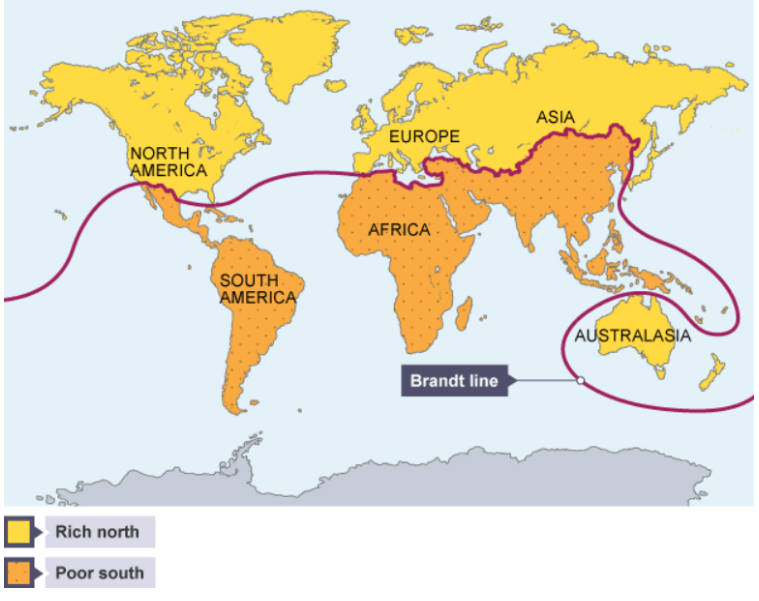6 September 2024 : Indian Express Editorial Analysis
1. From India to Global South
(Source: Indian Express; Section: The Ideas Page; Page: 13)
| Topic: GS2– International Relations |
| Context: |
| The article discusses Prime Minister Narendra Modi’s introduction of a “Development Compact” at the Third Voice of Global South Summit (VoGSS), aimed at enhancing South-South cooperation through capacity building, technology sharing, trade, grants, and concessional finance. |
What is Global South?

- American academic Carl Oglesby coined the term “Global South” in 1969 to denote a set of countries beset by the “dominance” of the Global North through political and economic exploitation.
- The phrase “Global South” refers broadly to the regions of Latin America, Asia, Africa, and Oceania separated by the Brandt line.
- It denotes regions outside Europe and North America, mostly low-income and often politically or culturally marginalised.
- China and India are the leading proponents of the Global South.
- The Brandt line is a visual representation of the world’s economic divide between the rich north and the poor south, based on GDP per capita.
- It was proposed by Willy Brandt in the 1970s and encircles the globe at a latitude of roughly 30° North.
What is the Voice of the Global South Summit?
- It is a new and unique India led initiative that envisages bringing together countries of the Global South and share their perspectives and priorities on a common platform across a whole range of issues.
- It is a reflection of India’s philosophy of Vasudhaiva Kutumbakam, or “One Earth, One Family, One Future”, and Prime Minister’s vision of Sabka Saath, Sabka Vikas, Sabka Vishwas and Sabka Prayas.
- Need of the VOGSS: Recent global developments, such as Covid pandemic, ongoing Ukraine conflict, mounting debt, challenges of food and energy security etc. have severely impacted the developing world.
- Widespread Ignorance: Often, the concerns of the developing world do not receive due attention and space on the global stage.
- Inadequate Resources: The relevant existing platforms have proven to be inadequate in addressing these challenges and concerns of the developing countries.
- Renewed Cooperation: It is India’s endeavor to provide a common platform to deliberate on the concerns, interests and priorities that affect the developing countries and also to exchange ideas and solutions.
Introduction to the Development Compact
- At the inauguration of the Third Voice of Global South Summit (VoGSS), Prime Minister Narendra Modi proposed a “Development Compact” aimed at rebalancing the terms of South-South engagement.
- This framework leverages five key modalities: capacity building, technology sharing, trade for development, grants, and concessional finance.
- Modi’s vision is to harmonize these approaches so that they reinforce one another, thereby establishing a new baseline for engagement with the Global South.
- This initiative could help mitigate the systemic indebtedness that many developing countries currently face, as illustrated by United Nations Conference on Trade and Development (UNCTAD) figures showing a public debt of $29 trillion in 2023 for developing countries.
Debt Crisis in the Global South
- The Global South has long grappled with imbalances in international engagement, which have led to widespread indebtedness.
- According to UNCTAD, in 2023, developing countries’ net interest payments on public debt totaled $847 billion, with 54 countries allocating more than 10% of their revenue solely to interest payments.
- These distressing figures are compounded by the failure of OECD countries to meet their longstanding commitments, such as the 0.7% Gross National Product (GNP) target for Official Development Assistance (ODA), agreed upon in 1970, or the $100 billion climate change financing pledge.
- The resulting debt crisis highlights the urgent need for a more equitable and development-centered international framework.
Revisiting Development in the Global South
- Modi’s call for the Global South to return to a focus on development echoes long-standing concerns about how global economic policies have marginalized these nations.
- The transition to finance-driven globalization, particularly through policies influenced by Reaganism and Thatcherism, along with the creation of the World Trade Organization (WTO), eroded the policy space for developing countries.
- This reinforced the fears articulated by economists like Raúl Prebisch, who argued that the global economic system disadvantages peripheral nations.
- The VoGSS offers hope for reintroducing development into the global policy discourse, promoting alternative pathways for growth, social inclusion, and environmental sustainability.
Sharing Development Experiences and Innovations
- The summit’s theme, “Empowering Global South for a Sustainable Future,” emphasizes the importance of mutual learning and sharing development experiences among Southern countries.
- Modi highlighted five areas where India’s development initiatives could serve as models for the Global South.
- These include the promotion of sustainability through the “Lifestyle for Environment” (LiFE) initiative, enhancing health security under the “One World, One Health” framework, and disaster resilience.
- Additionally, India’s strides in financial inclusion, particularly through Digital Public Infrastructure (DPI), and its efforts in education and capacity building were presented as replicable models for other Global South nations.
Institutional Frameworks for South-South Cooperation
- Institutional frameworks, such as India’s launch of the Global South Centre of Excellence (DAKSHIN), are crucial for facilitating South-South cooperation.
- These institutions are designed to promote knowledge exchange, foster skills development, and address challenges related to access, equity, and inclusion.
- The creation of a pluralistic approach to knowledge sharing allows the Global South to co-create strategies tailored to their unique challenges. By doing so, these frameworks can help strengthen the Global South’s collective vision for development.
New Initiatives to Strengthen the Global South
- Alongside the Development Compact, several other key initiatives were announced at VoGSS.
- These include a $2.5 million special fund for capacity building and a $1 million allocation for trade policy training.
- Additionally, India committed $25 million to a Social Impact Fund, aimed at addressing gaps in policy impact analysis and trade performance.
- India’s ongoing financial assistance to partner countries in the Global South, estimated at $7.5 billion annually, underscores its commitment to fostering development in the region.
Conclusion: A Call for Global South Unity
- Prime Minister Modi’s emphasis on unity within the Global South underscores the need for collective action to address common challenges.
- He called on the Global South to voice their concerns and propose positive, global solutions.
- The VoGSS provides a platform for discussing these issues, especially in a world where democratic governments are increasingly vulnerable to destabilizing forces such as terrorism and secessionist movements.
- The participation of figures like Muhammad Yunus, a prominent advocate for social business, further highlights the importance of addressing these challenges through collective efforts.
| What are Challenges for India as the “Voice of Global South”? |
|
Geopolitical Competition:
Food Security Dilemma:
Pharmaceutical Challenge:
Internal Development Issues:
|
| PYQ: “If the last few decades were of Asia’s growth story, the next few are expected to be of Africa’s.” In the light of this statement, examine India’s influence in Africa in recent years. (150 words/10m) (UPSC CSE (M) GS-2 2021) |
| Practice Question: Discuss the significance of Prime Minister Narendra Modi’s “Development Compact” introduced at the Third Voice of Global South Summit (VoGSS) in addressing the challenges faced by developing nations. (250 words/15 m) |





